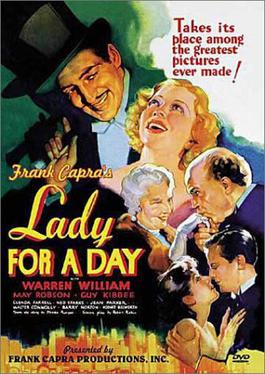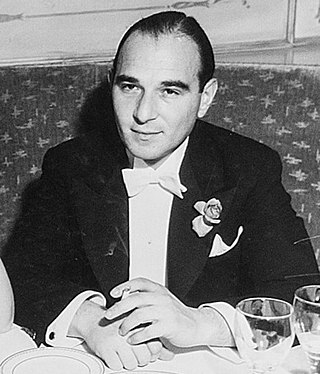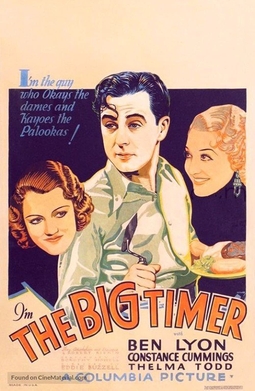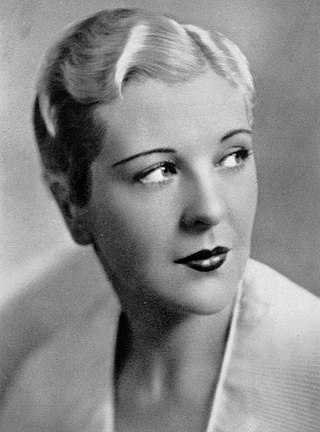Related Research Articles

Lady for a Day is a 1933 American pre-Code comedy-drama film directed by Frank Capra. The screenplay by Robert Riskin is based on the 1929 short story "Madame La Gimp" by Damon Runyon. It was the first film for which Capra received an Academy Award nomination for Best Director and the first Columbia Pictures release to be nominated for Best Picture. Capra also directed its 1961 remake, Pocketful of Miracles.

Joseph Leo Mankiewicz was an American film director, screenwriter, and producer. Mankiewicz had a long Hollywood career, and won both the Academy Award for Best Director and the Academy Award for Best Adapted Screenplay in consecutive years for A Letter to Three Wives (1949) and All About Eve (1950), the latter of which was nominated for 14 Academy Awards and won six.

The Short Stories of F. Scott Fitzgerald is a compilation of 43 short stories by F. Scott Fitzgerald. It was edited by Matthew J. Bruccoli and published by Charles Scribner's Sons in 1989. It begins with a foreword by Charles Scribner II and a preface written by Bruccoli, after which the stories follow in chronological order of publication.

Dorothy Edith Round, was a British tennis player who was active from the late 1920s until 1950. She achieved her major successes in the 1930s. She won the singles title at Wimbledon in 1934 and 1937, and the singles at the Australian Championships in 1935. She also had success as a mixed doubles player at Wimbledon, winning a total of three titles. After her wedding in 1937, she played under her married name, Mrs D.L. Little. During the Second World War, she played in North America and became a professional coach in Canada and the United States. Post-war, she played in British regional tournaments, coached, and wrote on tennis for newspapers.

Robert Riskin was an American screenwriter. He is best known for his collaborations with Frank Capra.

Broadway Bill is a 1934 American comedy-drama film directed by Frank Capra and starring Warner Baxter and Myrna Loy. Screenplay by Robert Riskin and based on the short story "Strictly Confidential" by Mark Hellinger, the film is about a man's love for his thoroughbred race horse and the woman who helps him achieve his dreams. Capra disliked the final product, and in an effort to make it more to his liking, he remade the film in 1950 as Riding High. In later years, the distributor of Riding High, Paramount Pictures, acquired the rights to Broadway Bill. The film was released in the United Kingdom as Strictly Confidential.
The Big Four were a quartet of debutantes in the Chicago social scene during World War I who viewed themselves as "the four most attractive and socially desirable young women in Chicago." The quartet consisted of Ginevra King, Edith Cummings, Courtney Letts, and Margaret Carry. The Big Four—a name they coined and bestowed upon themselves—were the preeminent socialites of their era, and each wore a rose-gold pinkie ring with phrase, "The Big Four 1914," engraved on the inner band.

Shirley Grey was an American actress. She appeared in more than 40 films between 1930 and 1935.

The Big Timer is a 1932 American Pre-Code sports drama film directed by Edward Buzzell and starring Ben Lyon, Constance Cummings and Thelma Todd. Produced and distributed by Columbia Pictures, it is about a boxer whose success goes to his head.
Marguerite Roberts was an American screenwriter, one of the highest paid in the 1930s. After she and her husband John Sanford refused to testify in 1951 before the House Un-American Activities Committee, she was blacklisted for nine years and unable to get work in Hollywood. She was hired again in 1962 by Columbia Pictures.

Natalie Moorhead was an American film and stage actress of the 1920s and 1930s. She was known for distinctive platinum blond hair.
Tom Stempel is an American film scholar and critic. He is a Professor Emeritus in Film at Los Angeles City College, where he taught from 1971 to 2011.

Alice D. G. Miller was an early American screenwriter. She was sometimes erroneously credited as Alice Duer Miller, another writer of no relation.
Gertrude Orr (1891–1971) was an American screenwriter who worked primarily at Fox in the 1920s and 1930s. Her best-known films include Call of the Yukon and The Blind Goddess.
Frances Hyland was an American screenwriter active between the late 1920s and the late 1940s. She was the first woman hired as a "gagman" at a film studio, and she wrote dozens of comedic scripts over the course of her career.
Jane Loring (1890–1983) was an American film editor and producer active during the 1920s through the 1940s. She was related to screenwriter Hope Loring.
Maude T. Howell (1887-1964) was an American screenwriter, producer, and assistant director active primarily during the 1930s. She was one of few women to hold an assistant directing position at the time.
Paul Perez was an American screenwriter active primarily during the 1920s and 1930s; he wrote for both English- and Spanish-language films over the course of his career, and often worked on Westerns. He also had several credits as an actor and editor.

Vanity Street is a 1932 American Pre-Code crime drama film directed by Nick Grinde and starring Charles Bickford, Helen Chandler and Mayo Methot.
Harry Ruskin was an American screenwriter and lyricist. He worked for a variety of Hollywood studios over the course of several decades. For MGM he co-wrote several entries in the Andy Hardy and Dr. Kildare series.
References
- ↑ "6 Feb 1968, Page 37 - The Courier-Journal at Newspapers.com". Newspapers.com. Retrieved 2018-12-27.
- ↑ "Six Screenplays by Robert Riskin". publishing.cdlib.org. Retrieved 2018-12-27.
- ↑ Scott, Ian (2015-01-13). In Capra's Shadow: The Life and Career of Screenwriter Robert Riskin. University Press of Kentucky. ISBN 9780813159669.
- ↑ Scott, Ian (2015). In Capra's Shadow: The Life and Career of Screenwriter Robert Riskin. University Press of Kentucky. p. 26. ISBN 978-0813159669.
- ↑ "6 Feb 1968, 33 - The Boston Globe at Newspapers.com". Newspapers.com. Retrieved 2018-12-27.